In the shifting landscape of modern leadership, one attribute consistently emerges as a determining factor in success: emotional intelligence (EI). As businesses adapt to hybrid work models and diverse teams, leaders who excel using EI outperform others by fostering empathy, resilience, and authentic connections. Research underlines this: 90% of top performers possess high emotional intelligence, correlating with a 58% impact on overall job performance. This blend of awareness and interpersonal skill isn’t just an asset but a necessity for visionary leaders steering organizations through rapid change. Emotional intelligence fuels innovation, elevates employee engagement, and reduces turnover by building trust and psychological safety. As Jeff Weiner, former LinkedIn CEO, asserts, “Managing compassionately is not just a better way to build a team, it’s a better way to build a company.” The journey of leadership in 2025 and beyond is fundamentally about mastering and applying emotional intelligence with strategic intent.
Understanding the Core Components of Emotional Intelligence and Their Relevance in Leadership EQ Applied
Emotional intelligence is a composite of several crucial abilities that enable leaders to manage themselves and others effectively. According to Daniel Goleman EI, these competencies form the backbone of Leadership EQ, encompassing self-awareness, self-regulation, motivation, empathy, and social skills. Each pillar directly influences a leader’s capacity to respond with savvy, adapt to complex situations, and inspire cohesive teams.
1. Self-Awareness: The Foundation of Emotional Intelligence 2.0
Self-awareness represents a leader’s ability to recognize personal emotions and understand their impact on thoughts and decision-making. Such awareness fosters authenticity and trust, creating a resilient leadership style capable of admitting mistakes and learning continuously. For instance, when a project falters, a self-aware leader pauses to assess emotional responses before acting, modeling composure.
Leaders can develop this skill through practices like journaling emotions, soliciting 360-degree feedback, and mindfulness exercises. Studies from Six Seconds reveal that self-awareness can improve leadership effectiveness by about 10%, making it a vital skill in today’s organizational climate.
2. Self-Regulation: Managing Emotions to Lead with Balance
Self-regulation equips leaders to maintain emotional composure even in stressful situations, preventing impulsive reactions that might disrupt team dynamics or client relationships. It involves a conscious pause, patience, and reframing negative encounters constructively.
For example, a leader receiving critical feedback might respond thoughtfully instead of defensively, which demonstrates maturity and inspires the team to do the same. Techniques such as deep breathing, focusing on core values, and reframing mental narratives help improve this competency.
3. Motivation: Driving Leadership Beyond External Rewards
Emotional intelligence includes intrinsic motivation — the inner drive to achieve meaningful goals and overcome setbacks with optimism. Research affirms this trait’s connection to higher team engagement and sustained performance. Leaders energized by internal purpose can instill shared vision and perseverance effectively.
They often approach failures not as deterrents but as learning opportunities, encouraging their teams to persist and innovate.
4. Empathy: The Greatest Connector in Leadership
Empathy enables leaders to tune into others’ emotions and viewpoints, building trust and supporting inclusivity. A 2025 EY study highlights that 86% of employees associate empathetic leadership with morale boosts, while 87% regard empathy as critical for inclusion.
Practicing empathy means listening actively, noting non-verbal cues, and offering support tailored to individual needs. For example, noticing a disengaged employee and initiating understanding conversations can significantly improve team cohesion and performance.
5. Social Skills: Facilitating Collaboration and Conflict Resolution
Social skills empower leaders to communicate influence, mentor, and manage conflict effectively. These skills promote respectful interaction and trust-building, essential for high-performing teams.
Leaders adept in social skills foster environments where colleagues collaboratively solve problems and embrace change. For instance, creating open forums during organizational change reflects strong social aptitude, helping teams navigate uncertainty with confidence.

| EI Competency | Leadership Impact | Development Techniques |
|---|---|---|
| Self-Awareness | Builds authenticity and trust, enhances decision-making | Journaling, 360° feedback, mindfulness |
| Self-Regulation | Prevents impulsivity, maintains team calm | Breathing techniques, reframing, value alignment |
| Motivation | Drives persistence and optimism, inspires teams | Goal setting, growth mindset cultivation, reflection |
| Empathy | Fosters inclusion, improves morale and trust | Active listening, emotional awareness, supportive dialogue |
| Social Skills | Enhances collaboration, improves conflict management | Open communication, mentorship, relationship building |
Practical Strategies to Build Leadership EQ and Drive Emotional Intelligence 2.0 Growth
Building and sharpening emotional intelligence is not an overnight process but requires deliberate practice and reflection. Leaders who actively develop their EI unlock substantial advantages in team management, problem resolution, and organizational resilience.
Integrating Mindfulness and Reflection into Daily Leadership
Mindful Leader practices enable leaders to remain present and centered, especially when navigating high-pressure or emotional scenarios. Simple daily meditation or breathing sessions create space for thoughtful responses rather than impulsive reactions.
The practice of journaling emotional experiences also helps in identifying triggers and recurring emotional patterns. Over time, such awareness accelerates self-regulation and resilience.
Leveraging Active Listening and Feedback for Enhanced Empathy
Active listening ensures leaders capture both spoken words and emotional subtleties, fostering a psychologically safe team environment. Coupled with soliciting and acting on feedback, it shows genuine investment in team members’ well-being.
Regular one-on-one check-ins provide opportunities to understand personal challenges, helping leaders adjust support and expectations constructively.
Creating a Culture that Supports and Models Emotional Intelligence
Embedding EI into organizational culture requires leaders at all levels to model emotionally intelligent behaviors and reward them in others. Companies like those adhering to The EI Advantage framework nurture trust, innovation, and customer loyalty by prioritizing emotional competencies.
This cultural commitment can include:
- Trainer-led workshops on emotional awareness and regulation
- Implementing Emotional Intelligence 2.0 assessments
- Incorporating EI into leadership development programs
- Providing coaching and mentoring resources focused on Leadership EQ
- Recognizing and incentivizing emotionally intelligent behaviors
Utilizing Technology and External Programs for EI Skill Development
Several tools and programs support the cultivation of emotional intelligence. For example, TalentSmart offers assessments and workshops based on groundbreaking research that correlates EI with job performance. Genos International specializes in the application of EI in leadership with robust evaluations and development pathways.
Meanwhile, platforms like Six Seconds provide a broad suite of resources, emphasizing applied EQ in corporate settings.
Integrating these resources as part of continuous learning pathways helps leaders maintain growth momentum.

| Strategy | Description | Expected Outcomes |
|---|---|---|
| Mindfulness Practices | Daily meditation, breathing exercises for emotional regulation | Improved self-awareness and stress management |
| Active Listening & Feedback | Engaging fully with team members’ verbal and emotional cues | Enhanced empathy and trust building |
| Cultural Embedding | Workshops, assessments, and leadership programs prioritizing EI | Increased innovation, engagement, and retention |
| Use of Tech & External Resources | Incorporating TalentSmart, Genos International, Six Seconds tools | Structured EI development and measurable progress |
How High Emotional Intelligence Enhances Team Dynamics and Leadership Success
Leadership EQ significantly shapes team cohesion, motivation, and productivity. Leaders proficient in EI create psychologically safe spaces, promoting open communication and innovative collaboration.
Boosting Trust and Communication Within Teams
Trust flourishes when leaders exhibit transparency, empathy, and consistency. Emotional intelligence enables leaders to acknowledge emotions and provide spaces where employees feel valued. For example, a manager aware of rising stress during a product launch can proactively offer support, reducing burnout.
Trusted teams tend to share ideas openly and collaborate without fear of negative judgment.
Resolving Conflicts with Emotional Clarity
Conflict is inevitable but manageable when leaders regulate their emotions and approach disputes with empathy. Rather than letting disagreements escalate, emotionally intelligent leaders facilitate dialogue to identify core issues and craft mutually beneficial solutions.
This ability reduces turnover and fosters a culture of respect and accountability.
Adapting Leadership Styles to Diverse Teams
Flexibility is vital in today’s diverse workplaces. Leaders with strong EI can read emotional cues and adjust their approaches, whether by providing encouragement, direct guidance, or coaching. This adaptability helps align team members toward shared goals while honoring individuality and cultural differences.
Empowered teams experience higher morale, greater engagement, and improved performance metrics.
| Leadership EI Skill | Team Impact | Organizational Outcome |
|---|---|---|
| Trust Building | Improved communication and psychological safety | Higher engagement and innovation |
| Conflict Management | Timely resolution of disputes and reduced emotional tension | Lower turnover and enhanced team accountability |
| Adaptive Leadership | Respect for individual differences and motivation alignment | Greater productivity and diverse perspectives leveraged |

Test Your Emotional Intelligence Knowledge
Frequently Asked Questions about Developing Leadership Emotional Intelligence
What practical daily habits can enhance a leader’s emotional intelligence?
Regular mindfulness meditation, journaling about emotional experiences, active listening during conversations, and seeking constructive feedback are excellent daily habits that build emotional intelligence.
How can emotional intelligence reduce employee turnover?
Leaders with high EI foster trust, address employee concerns empathetically, and create psychologically safe environments, increasing job satisfaction and reducing reasons for employees to leave.
Can emotional intelligence be measured accurately?
Yes. Tools like Emotional Intelligence 2.0 assessments, Genos International evaluations, and TalentSmart diagnostics provide reliable ways to assess and track EI development over time.
Does emotional intelligence impact decision-making?
Absolutely. EI enhances self-awareness and empathy, enabling leaders to make balanced decisions that consider the emotional aspects and needs of stakeholders.
How do emotionally intelligent leaders handle crises?
They maintain composure, communicate transparently, support their teams empathetically, and use emotional insights to navigate challenges effectively and resiliently.


